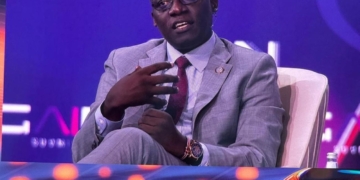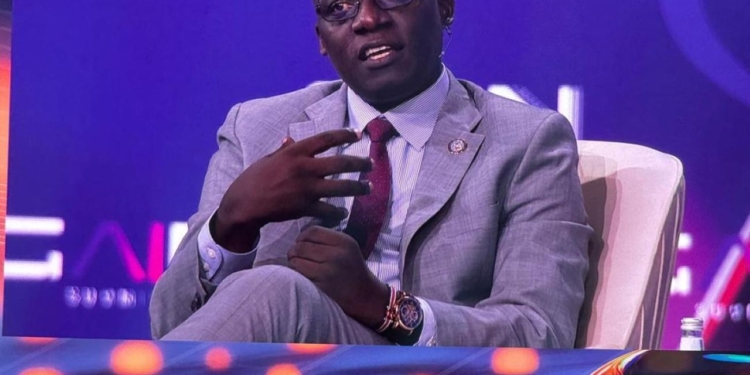
Kenya’s Special Envoy on Technology, Ambassador Philip Thigo, made a strong case for AI enablers and global finance reforms during the Global AI Summit (GAIN) 2024. Speaking at a high-profile panel session titled “Efforts in Shaping Global AI Governance from the Roadmap for Digital Cooperation to the Global Digital Compact,” Ambassador Thigo underscored the importance of bridging the digital divide for countries in the Global South and securing the necessary resources for AI investments, particularly in sectors critical to sustainable development.
In a discussion alongside other fellow UN Secretary General’s Advisory Body, including Dr. Latifa Al-Abdulkarim, Member of the Shura Council and Assistant Professor at King Saud University, Nighat Dad, Executive Director of the Digital Rights Foundation in Pakistan, Dr. Nazneen Rajani, CEO of Collinear AI, and Under Secretary General Amandeep Singh Gill, the UN Secretary-General’s Envoy on Technology, Thigo highlighted the pressing need for global finance architecture reform. He stressed that without substantial changes to the current financial system, developing nations would struggle to access the resources needed to invest in AI, particularly in areas that are vital for addressing global challenges but may not offer immediate returns for the private sector.
“AI must not be a tool reserved for a privileged few. It should be a resource accessible to all, particularly as we seek to solve the world’s most urgent challenges,” said Thigo. He pointed to energy, electricity, skills, data, and compute as fundamental enablers that the Global South must have in place to take full advantage of AI technologies. He added that global financial reforms, championed by Kenya’s President William Ruto, are essential to help countries access these enablers, especially for sustainable development projects like healthcare, climate resilience, and food security.
Thigo’s call for equitable access to AI technologies aligns with the broader objectives of the Global Digital Compact, which advocates for inclusive AI governance. His remarks emphasized that AI must be governed in a way that enables countries in the Global South to contribute to and benefit from the technology’s transformative potential.
Other panelists, such as Latifa Al-Abdulkarim and Nighat Dad, discussed various aspects of AI governance, content moderation, and ethical frameworks, offering a range of perspectives on how the world can shape responsible and inclusive AI policies. Amandeep Singh Gill, the UN Secretary-General’s Envoy on Technology, added that international cooperation is key to creating robust global AI governance structures.
Ambassador Thigo’s participation at GAIN 2024 underscores Kenya’s growing influence in global discussions on AI. The country’s advocacy for global finance reforms is anchored on President Ruto’s broader push for a more equitable global financial system that empowers developing nations to invest in long-term innovations.
Amb. Thigo reiterated President Ruto’s stance that “we cannot solve 21st-century problems with 20th-century financial systems,” emphasizing the need for an updated financial architecture that allows the Global South to invest in AI for sustainable development, even when such investments are not lucrative for private sector stakeholders. Thigo called for more international collaboration to create AI governance frameworks that promote fair access to AI technologies and support the use of AI in tackling “wicked problems” like public health crises, climate change, and food security.
GAIN 2024: A Platform for Inclusive AI Governance
AIN (Global AI Network) is an initiative led by the Saudi Data and Artificial Intelligence Authority (SDAIA). It aims to connect global experts, policymakers, researchers, and AI practitioners to foster collaboration and innovation in the field of artificial intelligence (AI). GAIN promotes the sharing of knowledge, best practices, and AI-driven solutions to address global challenges, especially in sectors like healthcare, energy, and sustainability.
This year’s Global AI Summit, hosted by the Saudi Data and Artificial Intelligence Authority (SDAIA), is themed “AI for a Better World: Pathways to Sustainable Development.” The summit brings together policymakers, AI experts, and innovators from around the world to discuss the future of AI governance and its role in solving global challenges. The event is part of Saudi Arabia’s broader effort to position itself as a global leader in AI development and innovation.
GAIN 2024 is particularly significant as it emphasizes the need for inclusive AI governance frameworks that consider the diverse needs of both developed and developing nations. By creating a space for dialogue, the summit aims to foster international cooperation and ensure that AI technologies are accessible to all, regardless of geographic or economic standing.


























 Continue with Google
Continue with Google